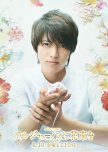Ok so let me be frank, I really liked Flowers for Algernon, so don't look down on this review only because I'm giving it a 6.5. Please let me develop first. My 6 equals a "fine", an "ok", something that goes beyond mediocrity, but that didn't manage to make use of the full potential and that partly managed to ruin my experience with it. However, Flowers for Algernon made me get really emotional despite everything, so i thought it deserves that + 0.5. I usually don't go out of my way to explain my rating this way, but in this case I think it was necessary. With this out of the way....
Story - 7 (Good)
I must be honest, this is actually my first J-drama and, while I know that Flowers for Algernon was adapted after an American novel with the same title, I think that Japan managed to give it a real emotional touch with how it managed to portray it. At first I was going to say that it was rushed, but then I looked back at it and it really isn't. The original novel has only more or less 300 pages, there was nothing else to say besides the main point of it: the life vision of a person affected by phenylketonuria,( or in common terms, a literally "stupid" person), as well as the people around him and questioning what would happen if this person suddenly became intelligent. What is the barrier between a stupid, a normal and a genius? Can these people get along with eachother or there will always be something that stops these people from caring for eachother and others that are different from them? I don't know how common this theme is in Japanese fiction (animes have a lack of these types of themes in general from my experience, I don't know about books or dramas), but I found it really refreshing from a general point of view; it's not something I usually encounter often in other mediums either.
I must start this with mentioning that in our lives, we tend to always be pushed to strive "normality". Society demands it. Most of us don't have a particularly high or low IQ, so sometimes what's common is accepted as "how things should be". But when you think of a person that is put in the position to not even be able to strive for that "normality" that connects most of us, then he or she is going to be treated as an outcast. No matter how one tries to change things, it has always been like that. Most people have a hard time to deal with people that are "different".: some think they're a bother, others don't know how to act, others just simply don't care. Flowers for Algernon is exactly about that.
However, while I can praise how it dealt with the topic on one side, some other times I don't think it did very well. While I understand that it tried to say that "being stupid" should be generally accepted (idealistically) and it's not a shame to have this problem, some other times it seemed almost selfish to say that. Maybe the point was exactly that: to leave that aftertaste, but it's a still difficult to deal with this topic and I don't expect it to manage to do it all perfectly. There will always be other stuff that you can say, other stuff that just don't always come right even if you never had any intention to make it sound bad. It's one of those touchy topics. So, I'm going to put up a disclaimer as well and mention that whatever I say in this review is not supposed to be discriminatory or offending or taken in any way other than what it is. Ok? Great! Moving on...
My main issue comes with the "side-stories" of this drama. I don't know if it's the thing of the actual novel too (someday I will read it and maybe come back here), but in the drama they looked almost like they tried to shove romance down my throat when it wasn't even remotely needed: Yanagawa and Mai were like that comic relief couple that were just there to talk about stuff and when it all ended, they weren't needed anymore. Hiyama and Rio were even worst with Hiyama getting this over the top, fast attachment to Rio after only seeing her 3 times in his life (believe me, being near a person in her condition is something difficult even for people that have been with that person for a lifetime. You can't tell me that a crush solves all that, unless Hiyama had this "hero" syndrome and felt in debt to mourn her when nobody else did). For me? They were both plot conveniences. Because they needed to do something for themselves, only for drama to be able to say "see? they have feelings! Now feel bad for them!".
The main couple quite annoyed me as well. I don't care that Sakuto is a really handsome guy, I would never be able to see him as a man, in a sexual way, after having to deal with him when he was "stupid". And if that sounds discriminatory, again, I'm not trying to be. I sometimes WORK with these people too and from my experience, i would never be able to look that way at a person that I'm taking care of as a mother and as a teacher. Or if I could, then definitely not as fast as it happened in this case. So again, though subjective, I felt like this romance was needed only as plot convenience for "feel bad for me even more!". Sure, it worked, it was really sad, but not as sad as it could have been if they kept the "motherly" feeling of the relationship only. But it was still nice how it tried to say that love and kindness doesn't always solve everything, despite being Sakuto's main philosophy. Life is just not that easy and it can't turn well for everybody.
Characters - 6 (Fine)
Besides Sakuto, Sakuto's mom and Hachisuka, I can't really praise anybody else. From this point of view, the drama was lacking. Maybe I can't even praise Sakuto till the end, but Sakuto is simply "Sakuto". There was nothing else to say.
Who impressed me, however, was Hachisuka. He is an ambitious man that started off by treating everybody as his tools towards success. A genius that arrogantly thought was above everybody else because of his intellect. But ultimately, there's no barrier between a genius and a stupid, not if you let it be one. Hachisuka realized that sometimes love is enough, letting go and giving up is sometimes needed and expected. It's no shame to give up, never too late to stop what you realized as wrong. His last scene, with the team accepting everything and going back to him despite him thinking he had enough, was simply very well executed and emotional.
As for the others, welp, I personally had a soft spot for Yanagawa, but not anybody else. Hiyama and Rio? Didn't really care, though I did like Hiyama in the beginning. I just thought he didn't grow as a person as well as he could have and it all revolved around Rio's condition way too much. Mai? Who even is Mai? Haruka? Eeh, I guess? Haruka was selfish till the end to me. Can I blame her? Not really. In her own way she was also one of the characters that maybe grew up the most, but just fails to impress. She doesn't have a breakthrough, she just goes with the flow, stubbornly holding to her own believes, sometimes selfish, sometimes rightful; it might be subjective from me that in the end i was kind of "meh" about her.
But going back to Yanagawa? I might have fallen for Kubota's charms here, but he seemed to be a more roundabout character than most, even if it doesn't come out as that. We didn't really have a solid background besides a mention, he didn't have a very important role and sometimes he doesn't even appear a lot, but everytime he does, I thought that it mattered. I felt like he was that normal person we needed to relate to and that he was useful in order to set the bar to what's "normal" between all those "differences". Let me explain. If Algernon-Sakuto represented the "genius" and Sakuto represented the "stupid", then Yanagawa represented the "average". Yanagawa was always that model of "normality" that Sakuto always yearned for, but both Sakuto and Algernon-Sakuto were never able to feel that "normality". Also, while Yanagawa used to use Sakuto, maybe not always with good intentions, once he was faced with the reality of it, he couldn't just pretend the issue doesn't exist, though he was painfully aware of his inability to do anything about it, because he was an "average person". He finally was able to feel what Sakuto felt for all his life: incompetence, not being able to do anything even when you desperately want to.
And then, I must speak of Algernon. Some of you might not even consider him a character, but this mouse just played with my feelings way too much. Maybe because he's just an animal, maybe because it was just portrayed in a very bittersweet way, but he was the character that I cherished the most. Like Sakuto, i thought Algernon was not just a mouse. He was a main character and shouldn't be ignored or forgotten.
Acting/Cast - 7 (Good)
I was initially almost looking down on it because I thought Japanese acting was kind of over the top for me, but in this drama it wasn't. it really wasn't.
I have some minor issues with Yamapi's acting as Sakuto, but I can't really blame him. it was a tough role and he didn't really fail, which is still commendable. He wasn't afraid to look funny or like an idiot and this is everything it was about, so i still praise him. Then, yes, Kubota is a very charming actor. He might not be the best, nor the most handsome, but he has that "something" that impressed me.
Music - 4,5 (Bad to Average)
Repetitive. The main song was pretty, sure, but everything was overall repetitive and very limited.
Overall - 6.5 (Fine to Good)
I suffer for the wasted potential when it comes to the execution of it. Story-wise, it did everything that it could do (if we don't count the side romances), but I can't not penalize the feeling of dread that I felt through episodes 6 to 8. It was almost painful to go through it and when it was all over, I didn't feel accomplished. Like "Yeah, this was one great story. One great drama that I'll always remember,". Nope. I just couldn't. I know that I'm not going to forget it because of the themes and it because it's my first J-drama, but it's also true that it didn't really leave me too emotionally attached. And that counts in the long run. Am I being too severe with it seeing everything that I have wrote? Probably. But this is also why I wanted to explain my rating; it was very subjective in the end. I wanted something more and I didn't get it and that reflected onto it. But don't think of it as a bad rating or a bad drama, on the contrary, it was so good, that it just couldn't help but not being able to match up to everything happening around it.
Do I recommend it? Definitely. There are not "but"s and "if"s. Just watch and see for yourself, then judge for yourself and maybe, just maybe, you'll be able to see the world with different eyes.
Was this review helpful to you?


 1
1





















